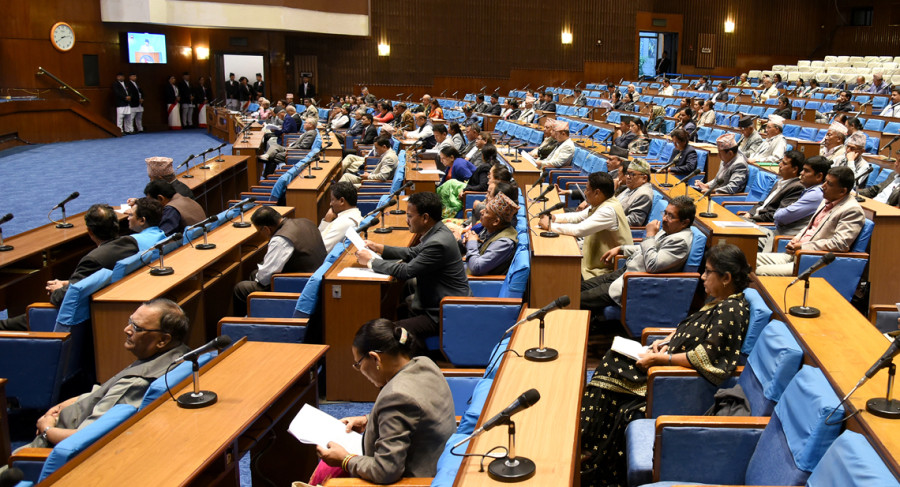Politics
Tendency to undermine Parliament detrimental to democracy, analysts say
As party leaders feud over Speaker, there’re concerns about the crucial bill session bearing the brunt.
Tika R Pradhan
Until constitution promulgation in 2015 and the subsequent elections two years later installed a strong federal government in the country, political instability was the common refrain of leaders who often blamed the long-drawn transition for the faltering democracy. Now that political stability has been achieved, the country will embark on the path of development while it implements the constitution and institutionalises democracy, leaders say.
But a recent event has once again exposed how a major Nepali political party, especially the one in power, is always averse to upholding democratic principles and is keen on holding the system hostage for its benefit.
The indecision of the ruling Nepal Communist Party on the House Speaker resulted in the postponement of the scheduled meeting, the second since the winter session of Parliament commenced, on Friday.
Political commentators and leaders describe such stalling of the House meeting only because of the ruling party as unfortunate.
“The House Speaker, in principle, is a non-partisan post, but Nepali political parties never tried to internalise this fact,” said Puranjan Acharya, a political analyst.
The executive, the judiciary and the legislature ensure separation of powers and they need to function independently for a healthy democracy.
But at a time when political parties face allegations that they are bent on influencing the judiciary, the ruling party holding the House hostage is yet another example of trampling upon democratic principles, commentators say.
“Speaker is a crucial constitutional position. This post should not remain vacant for long,” said Jhalak Subedi, a political analyst who has followed Nepal’s leftist politics for decades. “This is unfortunate and ridiculous that the ruling party is divided over the post and the House is bearing the brunt of the intra-party struggle.”
The Speaker’s post has remained vacant since Krishna Bahadur Mahara resigned in early October after attempted rape allegations.
Though Deputy Speaker Shiva Maya Tumbahangphe has staked her claim to the post, the Nepal Communist Party (NCP) leadership appears reluctant to let her lead the House. The tug-of-war between the former CPN-UML and the Maoist Centre, which merged last year into the Nepal Communist Party, to install their leaders as the Speaker resulted in the postponement of the House meeting on Friday.
The former UML is lobbying for Subas Nembang while the Maoist Centre has made a pitch for Agni Sapkota.
“Factional feuds in Nepali political parties are not new,” said Acharya. “Whether it is a communist party or the Congress, their leaders have been involved in extractive politics and misusing power for petty interests, instead of strengthening institutions and upholding democratic principles and values.”
According to Acharya, political parties have not spared any of the institutions and they have weakened them over the years.
Since the tendency was not nipped in the bud, a hallowed institution like Parliament has now fallen victim to intra-party feuds of the ruling party, said Acharya. “This is the reason our democracy continues to remain infant even after three decades.”
According to a ruling party leader, the Maoist faction is eying key constitutional posts in a bid to increase its bargaining power, as most of the key positions—President, prime minister and the National Assembly chair—are with the UML faction. “This is the reason the Maoist faction wants the Speaker’s post,” said the leader who spoke on condition of anonymity because he feared retribution for talking publicly about the intra-party struggle.
Commentators say the political stability refrain has turned out to be a farce, as parties have failed to show commitment to democratic principles and values.
“There’s nothing to wonder when the ruling party is holding the House hostage,” said CK Lal, a political analyst and Post columnist. “The Nepal Communist Party is on the path to achieving what its goal is—committed judiciary and committed legislature.”
According to Lal, the practice of liberal democracy is in the reverse order since the rise of Oli.
The ruling Nepal Communist Party is made up of two communist forces which followed completely opposite ideologies. While Oli’s CPN-UML became part of the parliamentary system after 1990, Dahal’s Maoist party waged a decade-long war against the state, seeking to capture power through the barrel of the gun. It laid down its arms in 2006 to join mainstream politics.
The two parties fought the 2017 elections together. The people gave them a strong mandate, an unprecedented one, allowing them to govern for the full five-year term and ending political instability that marred the country for decades.
It, however, has become clear now that a majority government alone is not sufficient to strengthen democracy, said Acharya.
Rajendra Maharjan, also a political commentator and contributor to Kantipur, the Post’s sister paper, however, said in Nepal, the principle of separation of powers was never duly exercised.
“The judiciary and legislature have always remained under the shadow of the executive,” Maharjan told the Post. “This time, the ruling party has undermined Parliament. The problem arises when one person controls the party and the government.”




 16.12°C Kathmandu
16.12°C Kathmandu















